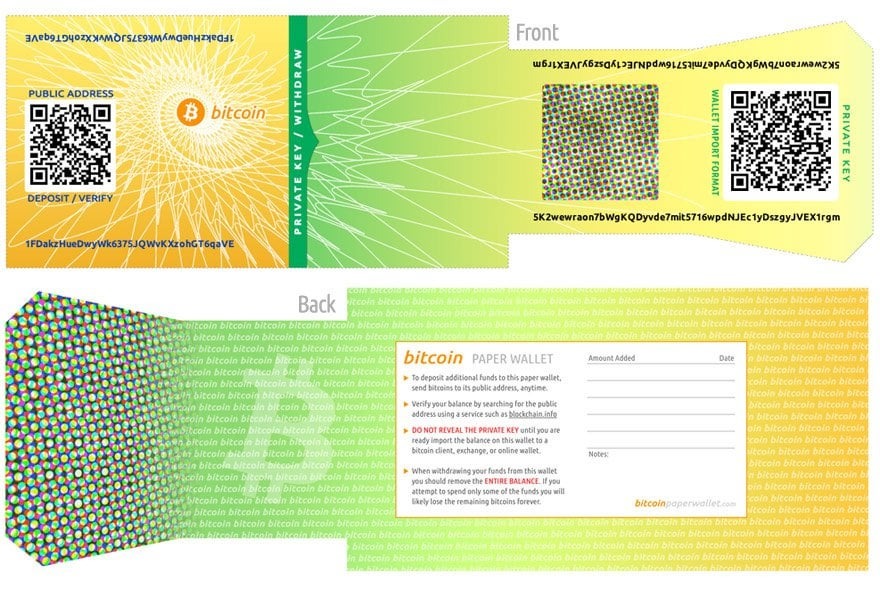
A Bitcoin paper wallet is a method of storing Bitcoin offline by printing the public and private keys on a piece of paper. This form of storage provides security against online threats by keeping the keys offline. However, proper usage is essential to ensure the safety and accessibility of the stored Bitcoin. This article aims to highlight common mistakes made when using Bitcoin paper wallets and provides guidance on how to avoid them.
Content
Improper Wallet Generation
Failing to Use Secure Software
Using insecure or unverified software to generate Bitcoin paper wallets can lead to security vulnerabilities. It is crucial to use reputable wallet generators known for their security features. Recommendations for secure software include offline versions of well-reviewed wallet generators such as bitcoinpaperwallet.io. Always verify the integrity of the software before use.
Inadequate Physical Security
Poor Storage Conditions
Storing Bitcoin paper wallets in easily accessible or unsecured locations increases the risk of theft or loss. To ensure security, store the paper wallet in a secure place such as a safe or a safety deposit box. Avoid keeping it in locations that are easily accessible or visible to others.
Exposure to Elements
Paper wallets are susceptible to damage from water, fire, and other environmental factors. To protect against these risks, use protective measures such as laminating the paper wallet or placing it in a waterproof container. Ensuring the wallet is shielded from potential physical damage helps maintain its integrity and longevity.
Lack of Backup Copies
Single Copy Risks
Having only one copy of a Bitcoin paper wallet poses a significant risk. If the single copy is lost, damaged, or stolen, access to the stored Bitcoin is lost permanently. To mitigate this risk, create multiple backup copies of the paper wallet.
Improper Backup Storage
Storing all backup copies together increases the risk of losing all copies simultaneously due to theft, fire, or other disasters. To reduce this risk, distribute backup copies across multiple secure locations. This strategy ensures that if one location is compromised, other copies remain safe and accessible.
Mishandling Private Keys
Sharing Private Keys
Sharing private keys with others increases the risk of unauthorized access to the Bitcoin stored in the wallet. It is essential to keep private keys confidential and not share them with anyone to maintain the security of the funds.
Incorrect Key Management
Mistakes in recording or transcribing private keys can lead to the inability to access the stored Bitcoin. To avoid this, carefully record the private keys, double-check for accuracy, and store the information securely. Proper key management practices ensure that the private keys remain accessible and accurate when needed.
Ignoring Wallet Condition
Failing to Check Wallet Regularly
Regularly checking the condition of a Bitcoin paper wallet is important to ensure it remains intact and readable. Periodic inspections can help identify any signs of wear and tear, damage, or fading that could compromise the wallet’s usability.
Not Updating Storage Solutions
Outdated storage methods may not provide adequate protection for a Bitcoin paper wallet. It is crucial to update storage solutions as better options become available. Consider modern and secure storage methods to enhance the protection of the paper wallet over time.
Misunderstanding Transaction Processes
Improper Fund Transfers
Transferring funds to and from a Bitcoin paper wallet can be complicated. Mistakes in this process can result in loss of funds. To avoid errors, follow a step-by-step guide for correct transfer processes, ensuring both the public and private keys are used appropriately.
Ignoring Transaction Fees
Understanding and accounting for transaction fees is crucial when using Bitcoin paper wallets. Ignoring these fees can lead to insufficient fund transfers or delayed transactions. Be aware of the current fee structure and plan transactions accordingly to manage and minimize fees effectively.
Overlooking Security Practices
Not Using Two-Factor Authentication (2FA)
Two-factor authentication (2FA) adds an additional layer of security for accessing Bitcoin. Although primarily used with online services, integrating 2FA into the process of accessing or recovering Bitcoin from paper wallets can enhance security. Implement 2FA wherever possible to protect against unauthorized access.
Neglecting Regular Security Audits
Regular security audits are essential to ensure that the Bitcoin paper wallet and its storage methods remain secure. Conducting periodic audits helps identify potential vulnerabilities and allows for timely updates to security practices. Regularly review and improve security measures to protect the stored Bitcoin effectively.
Conclusion
Bitcoin paper wallets offer a secure method for storing Bitcoin offline, but their effectiveness depends on proper usage. Common mistakes such as improper wallet generation, inadequate physical security, lack of backup copies, mishandling private keys, ignoring wallet condition, misunderstanding transaction processes, and overlooking security practices can compromise the safety of the stored Bitcoin. By avoiding these mistakes and following best practices, users can ensure the secure storage and management of their Bitcoin. It is important to remain vigilant and regularly review security measures to protect against potential risks.

Martin Wilson has been following the crypto space since 2013. He is a passionate advocate for blockchain technology, and believes that it will have a profound impact on how people live their lives. In addition to being an avid blogger, Martin also enjoys writing about developments in the industry as well as providing useful guides to help those who are new to this exciting frontier of finance and technology.
